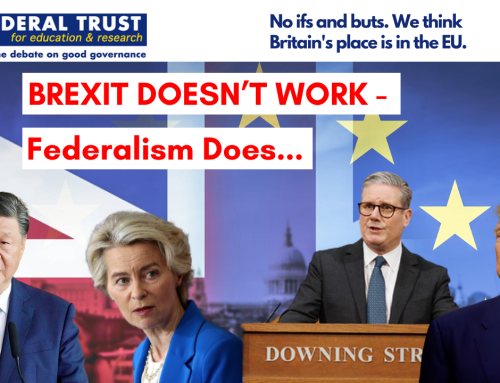The probable future of a no-deal UK is gloomy. The direct economic damages are only the beginning.
A non-deal or inadequate deal with the EU, exacerbating the troubles in Scotland and Northern Ireland, will kill the prospects for a meaningful deal with the US; Congress has already laid down the Irish criterion and the incoming President boasts of his Irish roots.
Absent a serious deal in both directions, the odds are stacked against the UK holding together. Break-up is more likely.
Break-up of the UK in turn brings economic damages more than doubling those of Brexit proper.
It also brings a spiral of knock-on political consequences. It fosters a manic-depressive pessimism: weakening of centrist political moorings, rise of national-utopia fantasies in each of them, an increase in extremism and instability. The logic of separate states leads also to gradual reversion toward intra-Isles geopolitical struggles. These consequences are, as they say, “unpredictable”; a diplomatic term that means they are in fact predictably very damaging, with great uncertainty however over their specifics.
Then there is the isolation. In this year of social distancing, we have learned how hard isolation is on the soul. An ill soul can do dangerous things. For 70 years, the former leader of the world has maintained a continuity of soul, despite the drastic loss of empire, by sublimating its former leadership into its special relation with its progeny across the ocean, and substituting the EU as a common turf for its former common turf as an empire. No-deal sunders both continuities. The consequences are, again, “unpredictable”, in the bad sense of the word. The one thing predictable is that both relationships will be greatly diminished.
Across the pond, most Americans will feel sorrow for the laying low of their mother country, in which they had taken pride. It was a country from whose history we derived the greater part of the story of the growth of our own freedom, our laws, our society itself. Others, however, will take an opposite pride: in the final end of the empire against which America had made its revolution, reducing it to the rubble of the medieval kingdom of England. The decline will be seized upon for the further deconstruction of America’s history, already well underway. America will no longer be born of a rising power but of a failed state, one that had grown for a time by oppressing the Irish and Scots and has now at long last received the judgment of history, a judgment that will be duly visited upon America too. Symbiotically, it will be used to reinforce the isolationist and unilateralist narrative, which credits America’s freedom solely to its getting away from all that old world tyranny and corruption, widowing it from the longer heritage of its gestation in that old world.
Other former British colonies will also lose a part of their identity. They too will suffer a loosening of their moorings.
There will be a weakening globally of the sense of the solidity of the growth and heritage of freedom, given the uniquely pivotal role of Britain in that history. The narratives of the growth and solidity of authoritarian orders will take up the slack.
It will not be good for the world. Fortunately not as bad as it will be for the UK itself. But not good.






